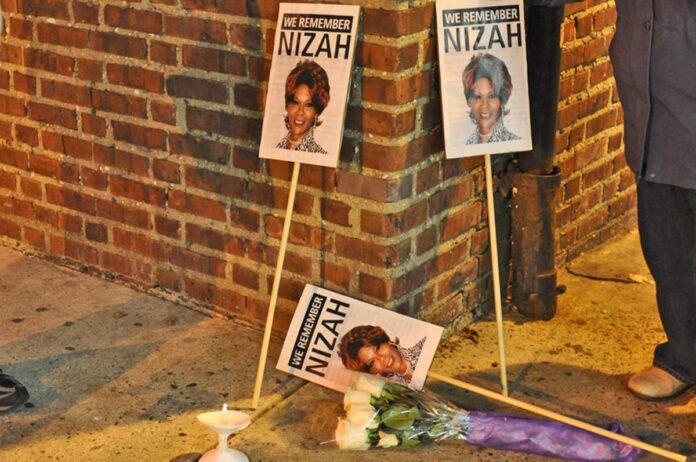PGN recently filed a legal document seeking enforcement of a 2008 court order mandating transparency in the Nizah Morris case. The paper is trying to obtain numerous records relating to the trans woman’s death that city officials thus far have declined to produce.
The document was filed March 19 in Philadelphia Common Pleas Court. City officials have until April 8 to respond. They had no comment for this story.
Morris, a beloved trans advocate, was discovered with a fatal head injury, shortly after receiving a “courtesy ride” from Philadelphia police in the Gayborhood. She died two days later, on Dec. 24, 2002. The following day, her death was declared a homicide due to blunt-force head trauma, which remains unsolved.
Elizabeth Skala, an officer involved in the courtesy ride, testified under oath at a Police Advisory Commission hearing that she was with Morris for about 16 minutes during the incident. Skala’s estimate would place her in the presence of Morris when she suffered a head injury, according to a timeline provided by 911 recordings.
The movements of two other officers during the courtesy ride — Thomas Berry and Kenneth Novak — also remain unclear. None has been charged with criminal wrongdoing in the Morris case. All three officers receive an annual salary of $78,092, according to city records.
In May 2008, Common Pleas Judge Jane C. Greenspan signed a stipulated order calling for transparency in the Morris case, after it was revealed the police department’s Morris homicide file was lost. Various agencies supplied Morris records for placement into a reconstituted file, including the District Attorney’s Office, and PGN was granted access to the file.
But in 2011 it was disclosed the DA’s Office withheld dozens of records from the reconstituted file, including key interviews with Skala, Novak and Berry. The Police Advisory Commission obtained many of these records from the DA’s Office but declined to share copies for placement in the reconstituted file.
Andrew J. Thomson, an attorney with Edelstein Law Firm, filed the March 19 motion to enforce provisions of the 2008 court order on behalf of PGN.
“PGN has been keeping this case alive in the public consciousness for almost twenty years,” Thomson said, in an email. “PGN sued to help make records public that could bring Nizah’s killer to justice. The court ordered that PGN have these records and we are bringing the action to ensure that both PGN and the general public get what we are entitled to. The city has provided these items to other entities. Now with widespread dissemination of the contents, we believe the truth about this horrible, unsolved crime will come to light.”
Melissa B. Melewsky, media law counsel at the Pennsylvania NewsMedia Association, expressed support for transparency in the Morris case. “Transparency is a core component of the criminal justice system, and it’s a travesty that PGN still has to fight for it almost 20 years after Nizah Morris’ death,” Melewsky said, in an email. “Pennsylvania laws governing access to criminal investigative records are among the worst in the nation. And this case illustrates how the law interferes with the community’s ability to understand crime, law enforcement’s response to it, and to seek policy changes when necessary. The court should grant access to records that provide basic insight into Nizah Morris’ death and law enforcement’s response to her murder so the community can understand what happened and can work with law enforcement to prevent similar tragedies in the future.”
